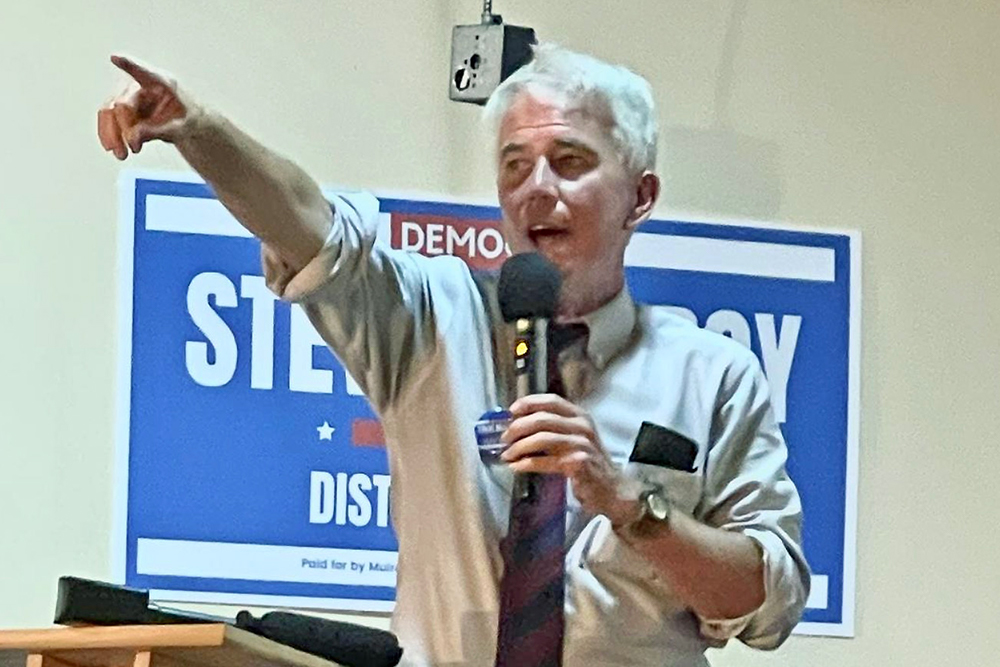The election of August 4, 2022, in Shelby County will likely go down in history for more reasons than the length of its ballot, the longest in local history.
Some 31 years since a political revolution occurred in the county’s core city of Memphis, electing an African-American mayor and broadening the concept of both citizenship and officialdom, a similar process is about to occur in Shelby County at large.
The county will still be the site of six suburban municipalities that are predominantly white in population and Republican in disposition, but these enclaves — their populations inflated by a generation of evacuees from the earlier transformation of Memphis — will now be subject to a governing apparatus that is increasingly diversified and bent on reform.
Shelby County already had a Black chief executive, Mayor Lee Harris, who had launched a number of initiatives designed to extend opportunity and ameliorate the lot of the county’s traditional underclass.
As a result of the election, the mayor’s partners in power will include a legislative body, the Shelby County Commission, whose 13 members will have a Black and female majority and a Democrat-to-Republican ratio of 9 to 4; a Juvenile Court judge who is the scion of African-American civil rights pioneers; and a Democratic district attorney general who, though white like the Republican DA he defeated, has declared an agenda that targets the residual racial inequities of the county’s criminal justice system.
Tennessee state government has become as inflexibly Republican and Trump-dominated as much of the rest of the old Confederacy and, via intensified assertion of its authority on home-rule local governments, has managed to suppress the influence of the state’s urban centers. Nashville had been a bastion of progressivism and New South sensibilities, but the capital city saw ruthless state gerrymandering in January that drastically reduced its legislative capacity and virtually scuttled its hundred-year tradition of electing Democrats to Congress.
As Memphis Congressman Steve Cohen, almost surely destined to be the state’s last surviving Democratic member of the U.S. House, foresaw back in the spring, Nashville’s loss would mean a potential gain in leadership possibilities for the Memphis area, where a Black majority made such disenfranchisement of its political base impractical. Among other things, Shelby County now becomes, post-election, a kind of laboratory for governmental experimentation.
The Democrats elected and re-elected last week are free to propose remedies not only to legacies of neglect in Shelby County government but also to the increasing arrogation of power to a Republican-dominated state government.
Consider only the three top-of-the-ticket officials newly confirmed by voters — Shelby County Mayor Lee Harris, District Attorney General Steve Mulroy, and Juvenile Court Judge Tarik Sugarmon.

All are long-term Democrats with specific ideas for new agendas. (Technically, Sugarmon’s office is nonpartisan, and accordingly he ran without party label, as, for that matter, did his defeated opponent, current — now outgoing — Judge Dan Michael, who essentially was considered a Republican.)
Harris, who invoked “segregation” as the county’s most severe problem during his first race for mayor in 2018, has bent his efforts toward the abolition of racial and economic disparities affecting the county’s underserved population. He has pioneered in the issue of criminal justice reform, in the establishment of re-entry programs for first-time offenders, and in the creation of a new Juvenile Justice Center. He has shown a willingness to take on the establishment’s sacred cows, as when he vetoed funding for a posh new swimming facility at the University of Memphis, holding to his opposition long enough to extract a pledge from university officials to move toward a $15-an-hour pay for all employees, the same plateau he has instituted for county workers.
Harris’ Republican opponent in the recent election, Memphis City Councilman Worth Morgan based his well-financed campaign on the idea that “we deserve better,” though he never was able to articulate any specifics behind that and other pleasantly-put platitudes.
The final vote was 78,552 for Harris to Morgan’s 56,789 and might have been larger, had Harris turned on the jets full-blast. The bottom line was, he didn’t need to.
A major background issue in the campaign, largely unvoiced, was the tension that had prevailed between county government and the state at the height of the Covid pandemic. Early difficulties in the county’s administering of vaccines were one problem; the state’s insistence on overriding home-rule medical authority, hardened and codified into law during a special legislative session, was another.
It is widely assumed that Harris’ future political ambitions run to a congressional bid down the line; it is less well-known that he has also thought of running for governor and, in fact, had considered that idea, among others, before opting for a second mayoral term.
That mayoral race was run, more or less, as a partnership with the campaign of Mulroy for district attorney general. Candidates Harris and Mulroy, who had served together on the law faculty of the University of Memphis, shared a busy campaign headquarters at the intersection of Poplar and Highland, and there was generous overlap between them at the supporter and strategic levels, as well.
The district attorney’s race became the marquee event to the county election campaign, and there were several reasons for that — one obvious one being that DA Amy Weirich was the last possessor of a county elective office for the Republican Party, which, for most of the time in the era of partisan county elections, had been predominant locally.
That trend ran counter to the fact that demographics — notably, in the growing African-American percentage of the county population — were increasingly favorable to Democrats. The GOP, which led the way toward partisan elections in 1992, had been able to do well on the strength of good candidates with crossover platforms. By 2018, the year of the “blue-wave” election, locally as well as nationally, the county’s Democrats had developed that knack, while Republicans, saddled with Trumpism, had drifted toward ideological extremism.
Mulroy — articulate, self-assured, and a demon for work — had been an active political force for years, leading crusades ranging from reforms in the mechanics of voting to efforts to maintain the Libertyland amusement park and its legendary Zippin Pippin roller coaster.

He served from 2006 to 2014 on the Shelby County Commission and hazarded a race for county mayor, losing in the Democratic primary to Deidre Malone.
As he liked to say, he had served in “the Bill Clinton Justice Department” and had experience in both the prosecution and defense aspects of criminal law. Highly active and respected as an academic scholar, Mulroy had ambitions to serve as a federal judge but, as a white male liberal, didn’t check the requisite number of boxes for an appointment in either Democratic or Republican administrations.
In local Democratic ranks, his credentials were considered nigh to perfect for the DA’s race, however, and, after coming out ahead in a three-way primary race, he threw himself into the general election showdown with Weirich, brandishing an agenda for reform that jibed with that of Harris and reflected cutting-edge ideas in legal and law-enforcement circles.
Weirich, though not anybody’s idea of an ideologue, styled herself as “Our DA” and campaigned as a law-and-order traditionalist concerned essentially with victims and their rights. She had financial assets of close to a million dollars for the campaign, but other numbers worked against her. For one thing, political affiliations in Shelby County were top-heavy for Democrats, and the early voting especially was in sync with that.
One set of numbers had especially adverse implications for the incumbent — those indicating a continuing upward climb in the crime rate, especially for crimes of violence, during her 11-year tenure. Mulroy was not shy about mentioning that fact and carried with him on the stump a cardboard graphic with bars depicting the steady rise.
For her part, Weirich launched an ad campaign depicting Mulroy, without explicit evidence, as a Defund the Police activist. Mulroy responded with ads noting the incumbent had been officially reprimanded more than once for judicial misconduct and called her the “worst” district attorney in the state.
In a series of debates, the two candidates lambasted each other.
There were genuine differences on the issues, with Mulroy outlining a progressive agenda seeking, among other things, reforms of the cash-bail system, a post-conviction review procedure, and a reduction in the number of juveniles whose cases were remanded to Criminal Court. He also vowed to amend what he saw as a disparity in the DA’s office, in which 80 percent of the attorneys were white and 95 percent of the accused in their caseloads were Black. He opposed “truth-in-sentencing,” which eliminated parole for certain violent felonies, while Weirich celebrated its codification into state law.
Late in the contest, what might have become a test case occurred on the matter of juvenile transfers. A youth whom Weirich had put on a restorative justice regime backslid and committed a brutal carjacking murder of Autura Eason-Williams, a revered local Methodist cleric. Both candidates were on the spot; almost reflexively, Weirich sought a transfer of the youth to adult court, while Mulroy fished somewhat inconclusively for a proper rhetorical response.
The moment passed, and so did a brief sensation arising from Weirich’s decision to be interviewed on “truth-in-sentencing” by “shock jock” Thaddeus Matthews, who had an harassment case pending that technically would call on her to prosecute.
In the end, Mulroy would win with surprising ease, polling 76,280 votes to Weirich’s 59,364.
Still, Mulroy’s victory, like Harris’, came somewhat as expected, and for all the Sturm und Drang of the DA race, for all the late money Mulroy got from a national network of criminal justice reformers, allowing him to compete on equal terms for advertising time, his margin of victory might simply have been owing to the superfluity of blues over reds in the voting population. More uncertain for most of the campaign season was the fate of the third member of the de facto reformist triad, Tarik Sugarmon.
The 2022 campaign was the second race for Juvenile Court judge by Sugarmon, who had run unsuccessfully in 2014 against incumbent Dan Michael, a loyalist in the administrations of former longtime Judge Kenneth Turner and Turner’s successor, Curtis Person. By 2022, Sugarmon was a judge himself, having won election to Memphis Municipal Court in the meantime, but he still hankered for the job of Juvenile Court Judge.
The son of civil rights pioneer Russell Sugarmon and the brother of Erika Sugarmon, who won a race for the Shelby County Commission in the May Democratic primary, Sugarmon believed, like the other two members of his de facto triad, that Black youths had been badly served by the existing social and judicial systems. At a joint press conference held in June in which he was endorsed by Harris and Mulroy, Sugarmon actually reached into the past and unexpectedly espoused a scheme, first advanced by then County Commissioner Mulroy and others in 2007, to double the number of Juvenile Court judges in order to deal with an ever-mounting caseload.
The proposal, when made in 2007, would have replaced one in which the Juvenile Court judge of record was assisted by 12 appointed referees or magistrates who actually tried cases and dealt with offenders. It was a system dictated originally by the fact that Judge Turner did not have a law degree and could not fully function in the judicial sense. The second-judge concept was approved by the County Commission at the time but brushed aside later by a state appeals court. Sugarmon, who had researched the matter, believes it can be successfully revived by the new group of county commissioners. It remains to be seen if he — and they — will try again.
In any case, the trio of Harris, Mulroy, and Sugarmon, who triumphed in a four-candidate race, edging out Michael by 10,000 votes, can be expected to proceed with an era of reforms in their respective jurisdictions.

And something of the sort can surely be expected of the newly elected County Commission. Early in the current century, this 13-member body was dominated by seven white male Republicans. Come September, the body will number nine Democrats and four Republicans; eight Blacks and five whites; seven women and six men; seven returnees and six neophytes (though the firebrand Henri Brooks, back for a second run, should perhaps not be so described).
No longer will the balance of power be held by what has been called a white patriarchy. For the record, the names of the new commissioners are as follows, those of incumbents in caps:
District 1, AMBER MILLS, R
District 2, DAVID BRADFORD, R
District 3, MICK WRIGHT, R
District 4, BRANDON MORRISON, R
District 5, Shante Avant, D
District 6, Charlie Caswell, D
District 7, Henri Brooks, D
District 8, MICKELL LOWERY, D
District 9, EDMUND FORD JR., D
District 10, Britney Thornton, D
District 11, Miska Clay Bibbs, D
District 12, Erika Sugarmon, D
District 13, MICHAEL WHALEY, D
This, folks, is change. And city government is on the flipper, too. There were two items on the ballot for city voters only. One was a race for City Court judge. The incumbent, former county equity officer Carolyn Watkins, was turned out by Kenya Hooks, the city’s chief prosecutor.
More important for what it augurs was the overwhelming defeat by Memphis voters of proposed Memphis Ordinance 5823 by a convincing margin of 52,582 to 26,759.
That referendum victory for a two-term limit means not just that neither Mayor Jim Strickland nor any City Council member who is now in a second term can run again in city government. It also mandates that the controls will pass to new faces and, mayhap, to new ideas. For some time the names of retiring county Commissioner Van Turner, Downtown Memphis Commissioner Paul Young, and state House Minority Leader Karen Camper have been circulated as possible mayoral aspirants. More names and more energies are almost sure to come.

There were anomalies elsewhere in the election, notably in the ranks of the judiciary. But first, props are called for in the case of longtime Republican activist Charlotte Bergman, an African American who has toiled in party ranks for more than a generation and became in the process a perennial primary candidate for the 9th Congressional District seat held, more or less in perpetuity, by Democrat Steve Cohen. There was a tendency for outsiders to see her activities as feckless, but she has just, and in the Republican primary, decisively turned away a moneyed entrepreneur named Brown Dudley, who supposedly had the wherewithal to give Cohen a run for his money in November. Clearly, GOP voters consider Bergman a legitimate voice for grievances and aspirations.
More kudos. Carol Chumney, the onetime state legislator and City Council member who made two races for Memphis mayor and then, to most eyes, had slipped away. Actually, she started taking care of her law practice and went to work on an interesting memoir, published just months ago. Now, after a spell of useful activism on the voting reforms front, she has won the election as Circuit Court judge in Division II. A good year, indeed.
And a tip of the hat to Joe Townsend, who came out of nowhere to beat veteran Judge Karen D. Webster in Probate Court, Division II, by 66,186 to 47,660.
There were, to be sure, unforeseen turns in the judges’ ballot as well. Most drastically, Mark Ward, Criminal Court judge in Division IX and the author of the primer on criminal law which is basic reading for all Criminal Court judges, went down to newcomer Melissa Boyd.
Joe Ozment, who had every known endorsement from various groups, including the Bar Association itself, lost in a multi-candidate race to Jennifer Fitzgerald for the Criminal Court, Division II, post.
Gerald Skahan, junior member of a brother-sister judicial team, lost his seat on the bench in General Sessions Criminal Court, Division 9, to Sheila Bruce-Renfroe, who won a judgeship on her second try. Meanwhile, Skahan’s sister, Paula Skahan, was run unexpectedly close by Michael Floyd in Criminal Court, Division I.
And Christian Johnson, a bankruptcy lawyer with a penchant for wearing cowboy hats, upset Judge Loyce Lambert-Ryan in General Sessions Criminal Court, Division 15.
There were other surprises and close calls, enough to suggest that, to an unusual degree, change was the order of the day.
Judicial races aside, most of that change, to repeat, was at the expense of the Republican Party in overtly partisan matchups, and it is hard, given demographic realities, to see how that trend will be reversed.
Increasingly, the politics of Shelby County will be antithetical to those of Tennessee state government. JB Smiley of the Memphis City Council made a brave, and perhaps premature, run at the Democratic nomination for governor. He won in Shelby County but lost statewide to Dr. Jason Martin of Nashville, another area which, like Memphis, has grievances against the state.

Perhaps, Martin can do better than expected against Republican Governor Bill Lee. Even if not, the bench of potential gubernatorial hopefuls, many of them from Memphis and many mentioned in this article, is almost certain to expand. And the change that got started in this year’s Shelby County election is just on its first legs.
